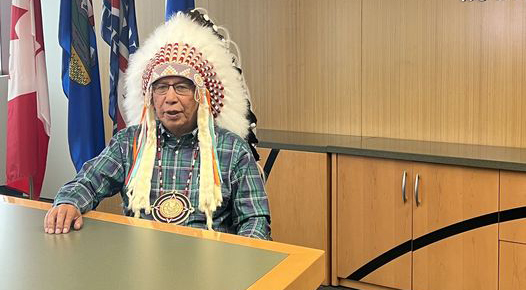By Jeremy Appel, Local Journalism Initiative Reporter
(ANNews) – As Métis Nation of Alberta (MNA) members await the results of their first election under the Otipemisiwak self-governance framework, First Nations are criticizing how the new MNA governance structure was foisted upon them without consultation. They are joining voices with several Métis groups who have also expressed concerns.
Chiefs from Treaties 6, 7 and 8 announced they were joining Ontario First Nations in opposition to Bill C-53, which was tabled by the federal government on June 21.
The proposed legislation formalizes the Canadian government’s recognition of “certain” Métis governments in Alberta, Saskatchewan and Ontario as self-governing entities constitutionally on par with First Nations.
Assembly of First Nations Interim National Chief Joanne Bernard called the bill a “colonial piece of legislation,” which was drafted over the heads of other Indigenous parties.
A joint statement from Treaties 6, 7 and 8 chiefs says they weren’t consulted at any step in the legislative process, invoking the United Nations Declaration on the Rights of Indigenous Peoples, which the federal government has endorsed, and its obligation for governments to obtain “free, prior and informed consent” from Indigenous Peoples.
“We have serious concerns about its possible impacts on the existing numbered Treaties, Treaty Lands and Treaty Peoples. Once again, Canada has left us out of the discussion, and we have been excluded from decisions with serious, long-standing implications,” the statement reads.
Given the vagueness of the bill’s text and a lack of engagement with First Nations, it’s unclear whether the federal government intends to allocate lands to the Métis organizations recognized in the legislation, the chiefs said.
They’re calling on the feds to withdraw the bill, which they describe as “ill-conceived and divisive.”
“We remind the Métis, they are descendants of the First Peoples of this land and must respect those that came before them.”
Dissenting Métis communities’ legal challenges quashed
While the MNA argues this empowers local communities to have a greater say in the MNA’s affairs, dissenting communities argue it runs roughshod over existing local governance structures, centralizing power in the hands of the MNA provincial council.
In November 2022, as voting was underway to approve the new constitution, leaders from 14 Métis locals, communities and settlements met at River Cree Casino and Resort in Enoch, just outside Edmonton, which resulted in them writing letters to Crown-Indigenous Relations Minister Marc Miller, asking him to intervene.
“The leaders represented at the meeting in Edmonton are democratically elected. They represent their communities. The MNA has no authority to claim governance over anyone. They are a provincially incorporated society — not a government,” the group said in a joint news release.
The 56,000 MNA members of voting age constitute about 44 per cent of the 127,000 Albertans who identify as Métis.
The constitution was approved with nearly 97 per cent support, but a turnout of just 15,725.
Prior to the new constitution, MNA members elected six regional presidents and vice presidents, in addition to a provincial president and vice president, which together formed the provincial council.
Under the new governance framework, MNA members elect 22 district representatives, as well as a president.
On May 10, before Bill C-53 was introduced, Grande Cache Métis Local #1994 pursued legal action against the MNA in the Court of King’s Bench, which was ultimately unsuccessful.
Grande Cache, which represents the historic Mountain Métis community and wasn’t one of the 14 communities who wrote a letter to Miller, said the Jasper House district is on their historical lands, arguing the new district boundaries outlined in the Otipemisiwak constitution essentially annexes their territory.
It also argued that since the MNA provincial council’s four-year term expired in September 2022, they don’t have a democratic mandate to make constitutional changes.
However, a special meeting was held in June 2022, in which MNA members voted to extend the term of the existing provincial council by a year so the constitution could be approved, with new elections under the constitution scheduled for September 2023.
Grande Cache’s filing called for the May 27 MNA special meeting where a bylaw implementing new districts was scheduled for a vote to be postponed.
Supporting Grande Cache’s court application were Lethbridge Métis Local #2003 and Athabasca Landing Métis Community, whose lands are incorporated into the MNA’s Foothills and Athabasca Landing districts, respectively. Both signed the November 2022 letter to Miller.
Athabasca Landing Métis Community is one of six communities that broke away from the MNA and formed the Alberta Métis Federation in 2020.
On May 30, Court of King’s Bench Justice M.J. Lema agreed with the MNA’s argument that, although their membership overlaps, Grande Cache isn’t part of the MNA, therefore it has no standing in the MNA’s internal operations.
Grande Cache residents who are MNA members have “two channels by which local concerns can be raised to the provincial level,” Lema wrote in his decision.
He rejected the notion that the MNA has a duty to consult local communities, arguing that obligation is exclusive to the federal government.
Lema ruled that, even if it were part of the MNA, Grande Cache would have to pursue its grievances via the Métis Judicial Council (MJC), whose decisions are final.
The Lethbridge local, alongside MNA Region 4, attempted to have the election postponement quashed at the MJC in July 2022, arguing the MNA didn’t provide a requisite three-week notice before the special meeting approving it.
The MJC ruled that the 21-day window isn’t required by the MNA’s bylaws.



Be the first to comment on "Chiefs from Treaties 6, 7 and 8 territories oppose controversial Metis nation self-governance bill"